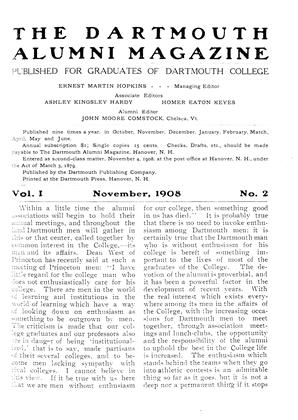"I deem it most fortunate that while we observe Dartmouth Night and at the same time, as an incident, celebrate the completion of Webster Hall, I am permitted as the representative of a classmate to announce the completion of the trust confided to President Tucker and myself for procuring a suitable memorial for the class of 1541.. The trust committed to us is fulfilled. President Tucker and members of the trustees, I present to Dartmouth College the bronze doors, now a part of Webster Hal], a memorial to the class of 1841, the gift of John Wyman Jones. The gift itself is not of great commercial value in these days of 'million' endowments, but it has a special value in the purpose for which it was given, and in the spirit of the giver. It shows the affection of one for his alma mater, and his affection for each and every member of his class, and his wish that his name be forever associated with the names of the class to stand as a memorial of college comradeship and college fraternity."
In these words Judge David Cross of the class of '41 commemorated the event of the fourteenth annual celebration of Dartmouth Night, and the presentation to the College of the bronze memorial doors. The exercises took place last Saturday evening in Webster Hall, and practically the whole College participated. A number of the prominent alumni, who returned to Hanover for the occasion, were present.
When Judge Cross appeared, accompanied by President Tucker, and took his seat upon the platform, the entire audience burst into enthusiastic applause, and it was some minutes before silence was restored. Again the applause broke out when President Tucker rose to introduce Judge Cross, and the demonstration that followed eloquently testified to the respect and love in which the grand old graduate is held.
President Tucker presided, and in his opening remarks said: "Dartmouth Night was established at a time when it seemed advisable for the College to become conscious of its own history. The ancient things that belong to a college are in danger from the generations near at hand but become safe as they pass over from the generations into the centuries. Not many decades ago a proposal was actually made to remove Dartmouth Hall in order to erect a more comm-odious building. The danger is not now wholly past for Dartmouth, and we are peculiarly happy in having such a memory to dedicate tonight."
Doctor Tucker than introduced Judge Cross, who formally presented the bronze doors to the College. In his opening remarks, he said: "There is a contagious spirit here which everyone who comes within its sway must feel. I am glad to be here tonight and to see all you young men before me." He then welcomed the members of 1912 to Dartmouth. As he proceeded, he made a strong plea for the memory of Rufus Choate and ended with a touching tribute to President Tucker.
In receiving the gift in behalf of the trustees Doctor Tucker said: "I ask that my thanks be conveyed by you to the surviving members of the class and to the artist, and I thank you for telling us what you have deemed fitting to tell us tonight."
The singing of "Men of Dartmouth" by the glee club ended the more formal part of the exercises, and the remainder of the evening was, as Doctor Tucker expressed it, "more in the nature of a family gathering." Unfortunately Surrogate C. H. Beckett '81, who was to have been one of the speakers of the evening, was not delivered by the Boston and Maine in time to appear, but the other speakers were on hand and delivered a wealth of wit and wisdom.
"Bucky" Chandler '98 spoke of the best phases of college spirit; Professor Fay spoke of George Ticknor and gave some interesting facts about the College Library; and Dr. Thomas Chalmers of Manchester, who received an honorary degree of D.D. from Dartmouth last June, spoke briefly on the "real things of life." The glee club sang the "Hanover Winter Song." "The Dartmouth Song" and a rousing "wah-hoo-wah" brought the keeping of the four-teenth Dartmouth Night to a close.
 View Full Issue
View Full Issue
More From This Issue
-
 Article
ArticleDARTMOUTH COLLEGE AND THE CLASS OF 1841
November 1908 By David Cross, '41 -
 Article
ArticleFOOTBALL
November 1908 -
 Article
ArticleWithin a little time the alumni associations
November 1908 -
 Class Notes
Class NotesLOCAL ASSOCIATIONS
November 1908 -
 Article
ArticleCOLLEGE NOTES
November 1908 -
 Class Notes
Class NotesCLASS SECRETARIES
November 1908








